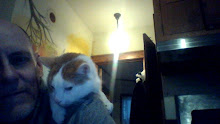FRANK O'HARA and DONALD DRAPER of MAD MEN
In an episode
of the television show
Mad Men,
advertising executive
Donald Draper
reads aloud
the final section
of Frank O'Hara's
poem titled
'Mayakovsky.
This poem
is from O'Hara's
collection
Meditations In An Emergency
(Grove Press, 1957).
Here is
what Donald Draper
reads:
Now I am quietly waiting for
the catastrophe of my personality
to seem beautiful again,
and interersting, and modern.
The county is grey and
brown and white in trees,
snows and skies of laughter
always diminishing, less funny
not just darker, not just grey.
It may be the coldest day of
the year, what does he think of
that? I mean, what do I? And if I do,
perhaps I am myself again.
of the television show
Mad Men,
advertising executive
Donald Draper
reads aloud
the final section
of Frank O'Hara's
poem titled
'Mayakovsky.
This poem
is from O'Hara's
collection
Meditations In An Emergency
(Grove Press, 1957).
Here is
what Donald Draper
reads:
Now I am quietly waiting for
the catastrophe of my personality
to seem beautiful again,
and interersting, and modern.
The county is grey and
brown and white in trees,
snows and skies of laughter
always diminishing, less funny
not just darker, not just grey.
It may be the coldest day of
the year, what does he think of
that? I mean, what do I? And if I do,
perhaps I am myself again.
Labels: Mad Men, Meditations In An Emergency, New York Poets, O'Hara [Frank], Poetry on Television, Television


